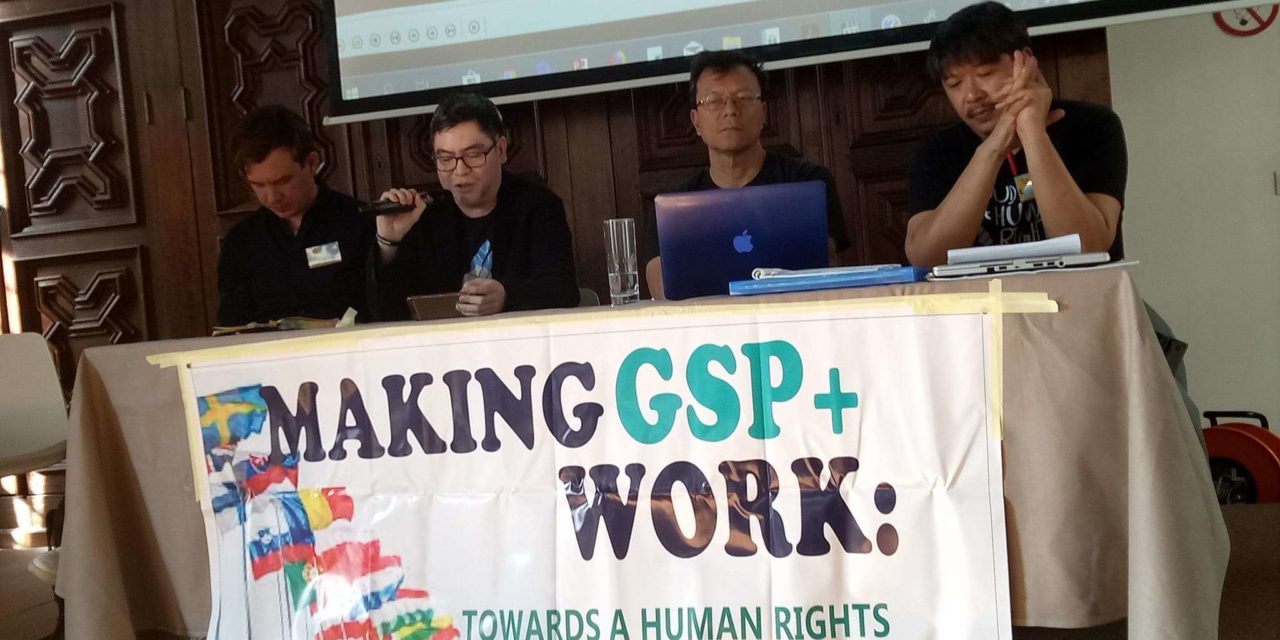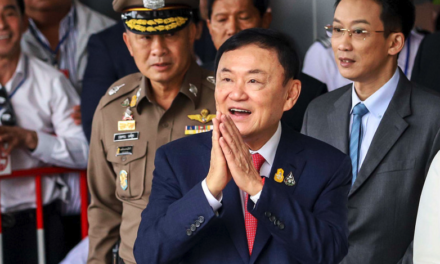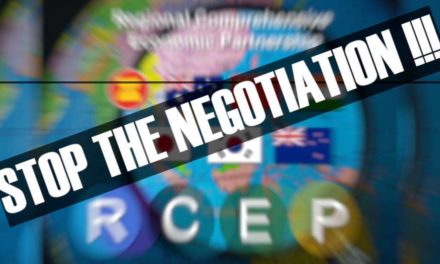The Generalized Scheme of Preferences + (GSP+) is essentially an effort to advance the implementation of commitments to international human rights and labor rights conventions through the use of an economic incentive–the opening up of the European Union(EU) market to developing country imports.
GSP+ combines two interests: that of human rights on the one hand, which are advanced through the implementation of HR obligations; and, on the other hand, economic or trade interests, advanced through the opening up of the EU market.
In an ideal world these two should be complementary and not competing interests. In reality however advancement of trade, investments and broader economic interests under the paradigm of corporate-led neoliberalism, has come at the expense of human rights
That I think is the crux of our discussion today. The central question is what is more ascendant, human rights or economic interests–or to be more precise human rights for all or corporate interest above all.
In the context of what is happening in the Philippines, the EU, and the broaderEU-Philippines relations, what is the state of human rights protection and fullfliment? Can we say that the dictum all human rights for all apply? And how about the economy? Whose interests are being served in pursuit of economic development in both regions?
EU-Philippine relations
Over the years, the EU has stressed the importance of human rights in its relationship with the Philippines.
Catherine Ashton Vice President of the European Commission under the Barroso Commission (2009-2014) had this to say about EU-Philippines relations in 2012 on the occasion of the signing of the Partnership and Cooperation Agreement.
“With the Philippines, Europe has a long historical relationship. We share many common beliefs such as on human rights or on democracy. The level of trust between the Philippines and the EU is such that sensitive political issues are already part of our daily work, be it co-operation on counter-terrorism, non-proliferation or the peace process in Southern Mindanao, where the EU is a willing and engaged partner,”
The Partnership and Cooperation Agreement (PCA) between the EU and the Philippines provides the over-all legal framework of engagement between the two parties encompassing engagement and cooperation between the EU and the Philippines on a broad range of areas, including political dialogue, trade, energy, transport, human rights, education, science and technology, justice, asylum and migration,
The Agreement starts with this affirmation from both parties:
Article 1: Respect for democratic principles and human rights, as laid down in the Universal Declaration on Human Rights and other relevant international human rights instruments to which the parties are contracting parties, and for the principle of the rule of law, underpins the internal and international policies of both parties and constitutes and essential element of this Agreement.
It is important to reflect on this primary principle, this essential element when we assess EU’s priorities in the Philippines, and how far the EU takes this principle seriously in light of the human rights situation in the Philippines.
Aside from its human rights agenda, the EU also has strategic economic agenda in the Philippines as part of the broader ASEAN region.
According to the report by the European Parliamentary Research Service, “It is in the EU’s strategic interest to strengthen economic cooperation with ASEAN, and to maintain its competitive position in the Asia-Pacific region, given its economic importance, combined with the expanding intraregional trade and investment relations and the growing number of regional integration initiatives.”
The EU is also pursuing a new generation bilateral free trade and investment agreement with the Philippines. Negotiations for the EU-PH FTA were launched in 2015, and so far two rounds of talks have been completed with a third round yet to be scheduled. While the EU embassy in Manila denies this, we suspect that the deteriorating human rights situation in the Philippines and Duterte himself is the reason for this fortunate slowing down of the process.
When the talks were launched in December 2015, the EU vowed to negotiate swiftly and conclude in two years time. What is this deal about and why is the EU pursuing this and similar ambitious trade deals with Malaysia, Indonesia and elsewhere across the globe?
The agenda underpinning these so called new generation FTAs go far beyond trade. These negotiations are no longer just about reduction of tariffs and market access. These are no longer just trade agreements but broader economic agreements that cover trade, investments, intellectual property rights, and regulatory coherence among others. These negotiations are about setting a ‘gold standard’ for future FTAs. These talks are about who gets to set the rules on global trade and investment with the US and the EU comprising the transatlantic alliance, while China on the other hand is aiming to consolidate its power within Asia.
Another common characteristic of these agreements is the corporate agenda underpinning and driving the talks. We see the imprint of corporations most notably in the investment chapter with the strong push for greater investor rights, and in the intellectual property rights chapters that enshrines a stricter IPR regime that benefits big pharmaceuticals.
The prize here is the coveted Asian market.
Asia is valuable in the equation because of its growing market, many of the countries in East and Southeat asia continue to experience high growth rates of between 3-7 percent, higher than world average.
Today ASEAN as a region is the EU’s third largest trade partner outside Europe (after the US and China). Bilateral trade between EU an ASEAN amount to over 230 billion euros (2013). ASEAN represents a market of around 600 million consumers.
The EU is the third largest market for Philippine exports next to Japan and the United States. In 2017 exports to the EU was valued at close to 8 billion euros representing 14 % of total Philppine exports. On the other hand the Philippine market with a significant value of over 5 billion euros represents only 7 % of Philippine imports. China, Japan, US, Korea and Thailand outrank the EU in terms of cornering the Philippine market. Something that the FTA hopes to address.
For the EU, another significant development making ASEAN an attractive strategic partner is the latter’s move towards regional integration, which would transform the population into one single market.
The EU feels particularly confident–perhaps a little less so in light of Brexit, but confident still–that its own experience in regional integration or community building could somehow be presented to ASEAN as a model and a basis of exchange of ideas and partnership.
Another important aspect of this intergation process in ASEAN, which is supposed to culminate with the realization of the ASEAN Economic Community (AEC) is the agenda towards greater connectivity. The Master Plan on ASEAN Connectivity defines a three-pronged strategy for physical connectivity mainly through infrastructure development; institutional connectivity through harmonization of rules to facilitate trade and investment; and people-to-people connectivity to promote deeper intra-regional social and cultural interaction.
The EU sees connectivity as another area of mutual interest with ASEAN, and is eyeing possible projects in the field of energy, transportation, and urban infrastructure as well as ‘green investments’ and trade in environmental goods and services. The EU has agreed to provide 85 milion euros to ASEAN to support its consolidation of the ASEAN Community.
Asia is valued for its raw materials. Countries like Cambodia, Laos and Myanmar for example are already starting to ease restrictions on foreign ownership and control of land, water, and natural resources, while there continues to be a mad scramble for control over these resources.
The EU has long pushed for instance for easing of constitutional restrictions in the Philippines on foreign ownership of land, an agenda that has been revived once more in the proposals for Charter Change, cloaked this time around in the Federalism agenda, as part of a package of economic reforms that are being pushed by among others European Chamber of Commerce.
The EU needs to import in order to export. Its competitiveness rests on its ability to secure raw materials needed to fuel its own manufacturing and industry. Securiing access to raw materials has become a major strategic policy area for the EU with its Raw Materials Intiaitive, as well as the US, and China.
Another important but sometimes overlooked aspect of the jockeying for position and increasing influence in the region is the importance of the South China Sea (or as we refer to it now, the West Philippine Sea) as a transhipment zone for energy supplies, goods, and raw materials.
It is therfore also in EU’s startegic interest to ensure that maritime security is strengthened in the region.
While the rhetoric underpinning EU and Asia relations continues to be cloaked in the language of joint cooperation, mutual benefit, shared experience, strategic partnership, and common vision, clearly the nuts and bolts of it is a deeper economic agenda of control, and the protection and promotion of the corporate interest.
The EU Dillema
The EU is facing a huge dilemma under Duterte: how to advance its strategic economic agenda in the midst of gross human rights violations.
Duterte ascended to the Presidency promising change, a break from the vestiges of elite-oligarchic rule in the Philippines, espousing a strongman approach to governance to fight criminality, eliminate drugs and deliver development particularly for the working class.
Budit Carlos has already reported on implications to Human Rights of Duterte’s war on drugs. After two years, the all out and violent anti-drug operation carried out by the Philippine National Police remains the centerpiece program of the Duterte administration.
Duterte is a challenge for the EU not because it supports the bloody war on drugs but because it essentially supports Duterte’s economic policies. That is the dilemma.
Dutertes’ economic policies or Dutertenomics aligns squarely with EU’s economic agenda. The Philippine Development Plan outlines an export-oriented strategy; an expansion of FTA engagements; a strong push for liberalization of services sector; a pro-corporate legislative agenda that includes proposed amendments to laws governing corporations; and securities and exchange to advance corporate interests. The agenda calls for greater ease of doing business and investor protection including support for dispute settlement. There is likewise support to amend the current Constitution to allow foreign ownership beyond 40%.
The Duterte government supports the connectivity agenda by way of its massive 150 Billion euro Build, Build Build infrastructure program. Despite the strong rhetoric against mining, Duterte himself supports more foreign investors, even offering to broker deals on behalf of indigenous communities to open their ancestral lands to foreign investments.
Everything is business as usual with PH-EU relations, if only we take out HR from the equation.
So we go back to the central question of the primacy of human rights. We go back to the question of whether human rights and rule of law are essential elements of EU-Philippine relations.
EU’s response
In light of a clearly a destructive, divisive and despotic government in the Philippines, the onus is on the EU to ensure that these questions are addressed in favor of human rights.
So far however, EU’s response has been wanting, and bordering on back pedaling on its avowed commitment to human rights.
Early this year, Stefano Manservisi, Director General of the European Commission for International Cooperation and Development on an official visit to the Philippines issued a statement saying “the EU will modify the standard text of the future agreements with the Philippines to avoid reiterating the condition on respect for human rights already stated in the Partnership and Cooperation Agreement (PCA)”. This reflect a diminished appreciation of human rights in the context of EU-Philippines relations.
We called out the EU on this and saw this as a clear accommodation on the part of the EU to the demands of the Philippine government. It exposes the double-speak of the EU on human rights and unmasks its human rights posturing for what it truly is: a bargaining chip that can be readily muted depending on what will work in favor of EU’s business and trade interests.
The implication of Mr. Manservisi’s statement is that in effect trade, commerce and finance are more important than human rights; and that the EU is willing to bend backwards and turn a blind eye to the issue of rights violations in order to ensure that economic relations will continue and will be strengthened.
This serious backpedaling by the EU comes at a time when the human rights situation in the Philippines has considerably worsened under Duterte. In the EU’s own global assessment of human rights and democracy (2016) it raised serious concerns over the war on drugs and its rising death toll, and more critically how the president’s statements and actions are encouraging a more aggressive approach by the police and vigilante-style extra judicial killings.
We added that “ It must also be stated that the EU’s strong push for an ambitious new generation free trade agreement, with provisions that could seriously undermine human rights, and its reluctance to subject economic agreements to human rights impact assessments raises questions on whether it recognizes the primacy of human rights at all.
The worsening human rights situation in the Philippines deserves a strong response from the EU. How many deaths will it take EU, for you to take action?
#









